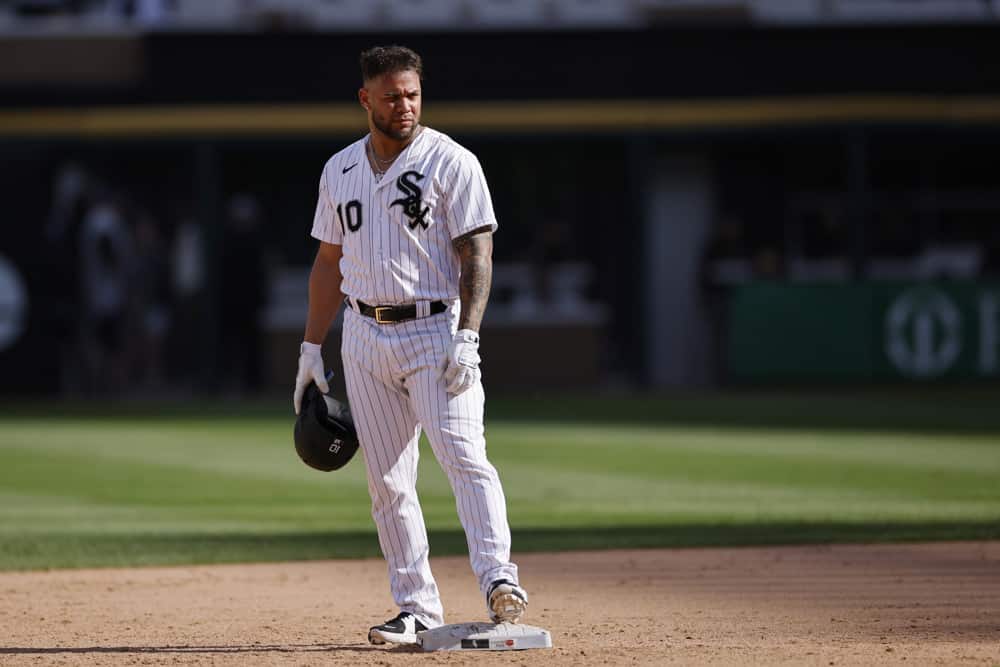Over the course of the rebuild, the White Sox zagged in ways rebuilding teams had usually zigged.
We've talked about their unprecedented contract extensions to players who hadn't yet made their MLB debuts, and it's strange that they remain unprecedented two years later. A copycat league hasn't joined the White Sox in committing $50 million to players before their first MLB at-bat like the Sox did for Luis Robert, or even $43 million like they did for Eloy Jiménez. Perhaps it speaks to José Abreu's unique pull, but it could just as well show that there's a level where teams would rather wait for the performance to justify it.
PERTINENT:
- February 2018: This White Sox rebuild can’t hinge on extensions
- January 2020: Extensions take different shape in this White Sox rebuild
- March 2022: Tim Anderson, last of the White Sox's big-time bargains
We've also debated Rick Hahn's definition of "the money will be spent" on multiple occasions. Most clubs that wiped their payrolls so clean they could eat off them used the room to splurge on at least one nine-figure contract. The White Sox's definition of a landmark winter involved Yasmani Grandal for $73 million, and Dallas Keuchel for $54 million. Both represented assertive moves that addressed roster issues, sure, but either contract could have been accommodated in so many other winters, especially ones where the White Sox didn't try.
These two developments are related. The Sox couldn't or wouldn't talk themselves into spending like a big-boy team in part because they codified the arbitration scales for their key young players well before it was necessary. Every team accounts for projected salaries, but the White Sox were on the hook for them, and in a way that inflated their luxury tax number well above their actual payroll.
Effectively, the White Sox doubled down on the talent they already had. It's the kind of strategy that works well when Jiménez is racking up Silver Sluggers and Yoán Moncada has a recurring membership to the 5 WAR Club. When Jiménez is annually absent (but don't dare call him injury-prone) and Moncada trends more toward ordinary, the Sox risk ending up on the losing end of a bidding war against themselves.
The six-to-seven years of team control is supposed to promote brutal payroll efficiency at the expense of the player, with the high-priced free agents balancing the scales years down the line. What this White Sox team looks like in its present form is the result of corner-cutting on both ends.
Try as he might to deny it, Keuchel is an example of that classic free-agent inefficiency. He was more than worth his contract on the front half of it, and now his salary figure is something to deal away, endure or swallow on the back half.
The problem is that Keuchel only commanded three guaranteed years, so that back half arrived in the middle of last season. The same can be said for Grandal, who's in the third year of a four-year deal and starting it with a .505 OPS. It'd certainly be more surprising if Grandal's decline suddenly arrived given how he finished the previous season, but not out of line for a 33-year-old catcher with repaired knees.
The deals everybody had in mind when it came to "the money will be spent" have a longer sustain pedal. Manny Machado and Bryce Harper are four years into their decade-plus commitments and are playing like MVPs, and had the Sox signed Zack Wheeler as they (legitimately) tried to, they'd have zero regrets as his five-year commitment approaches the halfway point.
Instead, they took their creative accounting practices and used them to redefine "top of market," whether by spending in lower-ceiling categories (catchers older than 30, closers) or lowering the bar (equating Keuchel with Wheeler and Gerrit Cole). This doesn't mean the deals weren't worth doing, but the nature of their commitments bought them less time.
Back when the White Sox signed Keuchel in 2019, many naturally linked the deal to the Cubs' signing of Jon Lester five years earlier. It wasn't outlandish -- both were left-handed and short of overpowering, both had accomplished plenty at the individual and team levels, and the arrivals of both to Chicago signaled greater ambitions for their respective teams.
Then again, Lester signed for six years and $155 million, or $100 million more than was guaranteed to Keuchel, and the proportionality held up. Lester contributed to the Cubs at a high level for 4½ seasons before the decline arrived, which was enough to cover their World Series title and multiple subsequent attempts at recapturing that glory. Keuchel's best lasted only 1½, and now he's desperate to hang on while the White Sox's own attempts at peaking are struggling to get off the ground.
Keuchel is desperately trying not to sound desperate. After his latest dud on Thursday, he's saddled with career worsts in ERA (7.88), FIP (6.20), ground-ball rate (50.8), home run rate (1.7/9 IP), walk rate (12.2 percent), strikeout rate (also 12.2 percent) and WHIP (2.16), to name too many. He'd be on pace for a -4 bWAR season if he were to see this through for an entire season, but there are laws against that sort of thing.
There's little Keuchel can say that will satisfy short of "I suck," but as I've said before, you probably can't admit your stuff isn't working when you throw 87, lest you validate what everything else in the world suggest.
Still, White Sox fans have a whole lot of experience watching guys whose stuff stopped working, so Kid Keuchy can't kid kidders.
“I've got to do my job. That's first and foremost,” Keuchel said. “If I don't do my job then I'm the first to admit, you've got other options. I've afforded myself some leeway and I'm in no way, shape or form out of this thing. It's been a little bit of a rollercoaster the first month and change and the second half of last year outside of a couple injuries.
“If people want to write me off, that's OK. I've been written off before and I'm a competitor and I'm an athlete and we'll turn the tide. It's not the first time this has happened. It can turn right back into our favor." [...]
“One thing or another, it's going to get there,” Keuchel said. “As much as it hurts tonight and last start, it'll get there. We'll be talking differently soon."
Keuchel might be technically correct with that last sentence, because a DFA would change the conversation.
There is a danger in making things too much about Keuchel, because he's the team's fifth starter by performance, and most teams' fifth starters are swapped out over the course of the season for equally dodgy options. The offense is the more pressing issue, with a lineup that struggles to field more than three productive hitters at any one time, and a manager who loves to sink time into utility players who get in the way. (We'll also see what the roster looks like when the team travels to Toronto next week, because perhaps the Sox will have to reach to fill out the roster around unvaccinated players.)
Keuchel is just the softest target, both for his performance, and the way his quotes soft-pedal the reality inflicted upon the fan base on an everyday basis. The White Sox should be stronger than their .500 record and -42 run differential suggests, but now that we've advanced into the season's second quarter, it'd be the slightest bit comforting if the decision-makers started demanding better.





